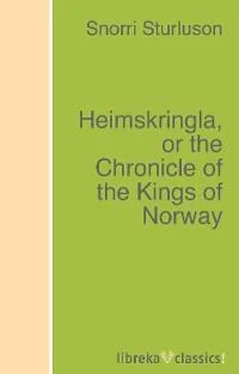Snorri Sturluson - Heimskringla, or the Chronicle of the Kings of Norway
Здесь есть возможность читать онлайн «Snorri Sturluson - Heimskringla, or the Chronicle of the Kings of Norway» — ознакомительный отрывок электронной книги совершенно бесплатно, а после прочтения отрывка купить полную версию. В некоторых случаях можно слушать аудио, скачать через торрент в формате fb2 и присутствует краткое содержание. Жанр: unrecognised, на английском языке. Описание произведения, (предисловие) а так же отзывы посетителей доступны на портале библиотеки ЛибКат.
- Название:Heimskringla, or the Chronicle of the Kings of Norway
- Автор:
- Жанр:
- Год:неизвестен
- ISBN:нет данных
- Рейтинг книги:3 / 5. Голосов: 1
-
Избранное:Добавить в избранное
- Отзывы:
-
Ваша оценка:
- 60
- 1
- 2
- 3
- 4
- 5
Heimskringla, or the Chronicle of the Kings of Norway: краткое содержание, описание и аннотация
Предлагаем к чтению аннотацию, описание, краткое содержание или предисловие (зависит от того, что написал сам автор книги «Heimskringla, or the Chronicle of the Kings of Norway»). Если вы не нашли необходимую информацию о книге — напишите в комментариях, мы постараемся отыскать её.
libreka classics – These are classics of literary history, reissued and made available to a wide audience.
Immerse yourself in well-known and popular titles!
Heimskringla, or the Chronicle of the Kings of Norway — читать онлайн ознакомительный отрывок
Ниже представлен текст книги, разбитый по страницам. Система сохранения места последней прочитанной страницы, позволяет с удобством читать онлайн бесплатно книгу «Heimskringla, or the Chronicle of the Kings of Norway», без необходимости каждый раз заново искать на чём Вы остановились. Поставьте закладку, и сможете в любой момент перейти на страницу, на которой закончили чтение.
Интервал:
Закладка:
17. THE SEASONS IN NORWAY AT THIS TIME.
While Gunhild's sons reigned in Norway the seasons were always bad, and the longer they reigned the worse were the crops; and the bondes laid the blame on them. They were very greedy, and used the bondes harshly. It came at length to be so bad that fish, as well as corn, were wanting. In Halogaland there was the greatest famine and distress; for scarcely any corn grew, and even snow was lying, and the cattle were bound in the byres (1) all over the country until midsummer. Eyvind Skaldaspiller describes it in his poem, as he came outside of his house and found a thick snowdrift at that season:—
18. THE ICELANDERS AND EYVIND THE SKALD.
Eyvind composed a poem about the people of Iceland, for which they rewarded him by each bonde giving him three silver pennies, of full weight and white in the fracture. And when the silver was brought together at the Althing, the people resolved to have it purified, and made into a row of clasps; and after the workmanship of the silver was paid, the row of clasps was valued at fifty marks. This they sent to Eyvind; but Eyvind was obliged to separate the clasps from each other, and sell them to buy food for his household. But the same spring a shoal of herrings set in upon the fishing ground beyond the coast-side, and Eyvind manned a ship's boat with his house servants and cottars, and rowed to where the herrings were come, and sang:—
So entirely were his movable goods exhausted, that he was obliged to sell his arrows to buy herrings, or other meat for his table:—
KING OLAF TRYGVASON'S SAGA.
PRELIMINARY REMARKS.
Hitherto the narrative has been more or less fragmentary. With Olaf Trygvason's Saga reliable history begins, and the narration is full and connected. The story of Hakon the earl is incorporated in this saga.
Accounts of Olaf Trygvason may be found in Od the Monk's legendary saga, in parts of "Agrip", "Historia Norvegiae", and in Thjodrek. Icelandic works on this epoch are:
"Egla", "Eyrbyggja", "Finboga", "Floamanna", "Faereyinga", "Hallfredar Saga", "Havardar Saga", "Are's Islendinga-bok", "Kristni Saga", "Laxdaela", "Ljosvetninga", "Njala", "Orkneyinga", "Viga Glums Saga", and "Viga Styrs Saga".
The skalds quoted are: Glum Geirason, Eyvind Finson, Skaldaspiller, Einar Skalaglam, Tind Halkelson, Eyjolf Dadaskald, Hallarstein, Halfred Vandraedaskald, Haldor Ukristne, Skule Thorsteinson, and Thord Kolbeinson.
1. OLAF TRYGVASON'S BIRTH.
King Trygve Olafson had married a wife who was called Astrid. She was a daughter of Eirik Bjodaskalle, a great man, who dwelt at Oprustader. But after Trygve's death (A.D. 963) Astrid fled, and privately took with her all the loose property she could. Her foster-father, Thorolf Lusarskeg, followed her, and never left her; and others of her faithful followers spied about to discover her enemies, and where they were. Astrid was pregnant with a child of King Trygve, and she went to a lake, and concealed herself in a holm or small island in it with a few men. Here her child was born, and it was a boy; and water was poured over it, and it was called Olaf after the grandfather. Astrid remained all summer here in concealment; but when the nights became dark, and the day began to shorten and the weather to be cold, she was obliged to take to the land, along with Thorolf and a few other men. They did not seek for houses unless in the night-time, when they came to them secretly; and they spoke to nobody. One evening, towards dark, they came to Oprustader, where Astrid's father Eirik dwelt, and privately sent a man to Eirik to tell him; and Eirik took them to an out-house, and spread a table for them with the best of food. When Astrid had been here a short time her travelling attendants left her, and none remained, behind with her but two servant girls, her child Olaf, Thorolf Lusarskeg, and his son Thorgils, who was six years old; and they remained all winter (A.D. 964).
2. OF GUNHILD S SONS.
After Trygve Olafson's murder, Harald Grafeld and his brother Gudrod went to the farm which he owned; but Astrid was gone, and they could learn no tidings of her. A loose report came to their ears that she was pregnant to King Trygve; but they soon went away northwards, as before related. As soon as they met their mother Gunhild they told her all that had taken place. She inquired particularly about Astrid, and they told her the report they had heard; but as Gunhild's sons the same harvest and winter after had bickerings with Earl Hakon, as before related, they did not seek after Astrid and her son that winter.
3. ASTRID'S JOURNEY.
The spring after (A.D. 964) Gunhild sent spies to the Uplands, and all the way down to Viken, to spy what they could about Astrid; and her men came back, and could only tell her that Astrid must be with her father Eirik, and it was probable was bringing up her infant, the son of Trygve. Then Gunhild, without delay, sent off men well furnished with arms and horses, and in all a troop of thirty; and as their leader she sent a particular friend of her own, a powerful man called Hakon. Her orders were to go to Oprustader, to Eirik, and take King Trygve's son from thence, and bring the child to her; and with these orders the men went out. Now when they were come to the neighbourhood of Oprustader, some of Eirik's friends observed the troop of travellers, and about the close of the day brought him word of their approach. Eirik immediately, in the night, made preparation for Astrid's flight, gave her good guides, and send her away eastward to Svithjod, to his good friend Hakon Gamle, who was a powerful man there. Long before day they departed, and towards evening they reached a domain called Skaun. Here they saw a large mansion, towards which they went, and begged a night's lodging. For the sake of concealment they were clad in mean clothing. There dwelt here a bonde called Bjorn Eiterkveisa, who was very rich, but very inhospitable. He drove them away; and therefore, towards dark, they went to another domain close by that was called Vidar. Thorstein was the name of the bonde; and he gave them lodging, and took good care of them, so that they slept well, and were well entertained. Early that morning Gunhild's men had come to Oprustader, and inquired for Astrid and her son. As Eirik told them she was not there, they searched the whole house, and remained till late in the day before they got any news of Astrid. Then they rode after her the way she had taken, and late at night they came to Bjorn Eiterkveisa in Skaun, and took up their quarters there. Hakon asked Bjorn if he knew anything about Astrid, and he said some people had been there in the evening wanting lodgings; "but I drove them away, and I suppose they have gone to some of the neighbouring houses." Thorstein's labourer was coming from the forest, having left his work at nightfall, and called in at Bjorn's house because it was in his way; and finding there were guests come to the house, and learning their business, he comes to Thorstein and tells him of it. As about a third part of the night was still remaining, Thorstein wakens his guests and orders them in an angry voice to go about their business; but as soon as they were out of the house upon the road, Thorstein tells them that Gunhild's messengers were at Bjorn's house, and are upon the trace of them. They entreat of him to help them, and he gave them a guide and some provisions. He conducted them through a forest to a lake, in which there was an islet overgrown with reeds. They waded out to the islet, and hid themselves among the reeds. Early in the morning Hakon rode away from Bjorn's into the township, and wherever he came he asked after Astrid; and when he came to Thorstein's he asked if she had been there. He said that some people had been there; but as soon as it was daylight they had set off again, eastwards, to the forest. Hakon made Thorstein go along with them, as he knew all the roads and hiding-places. Thorstein went with them; but when they were come into the woods, he led them right across the way Astrid had taken. They went about and about the whole day to no purpose, as they could find no trace of her, so they turned back to tell Gunhild the end of their travel. Astrid and her friends proceeded on their journey, and came to Svithjod, to Hakon Gamle (the Old), where she and her son remained a long time, and had friendly welcome.
Читать дальшеИнтервал:
Закладка:
Похожие книги на «Heimskringla, or the Chronicle of the Kings of Norway»
Представляем Вашему вниманию похожие книги на «Heimskringla, or the Chronicle of the Kings of Norway» списком для выбора. Мы отобрали схожую по названию и смыслу литературу в надежде предоставить читателям больше вариантов отыскать новые, интересные, ещё непрочитанные произведения.
Обсуждение, отзывы о книге «Heimskringla, or the Chronicle of the Kings of Norway» и просто собственные мнения читателей. Оставьте ваши комментарии, напишите, что Вы думаете о произведении, его смысле или главных героях. Укажите что конкретно понравилось, а что нет, и почему Вы так считаете.












